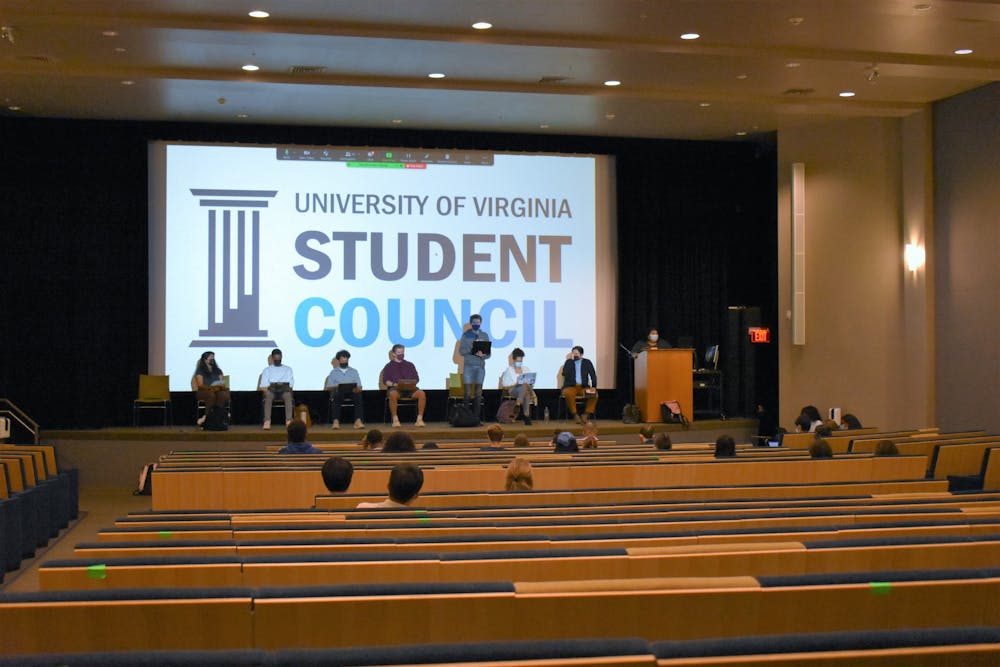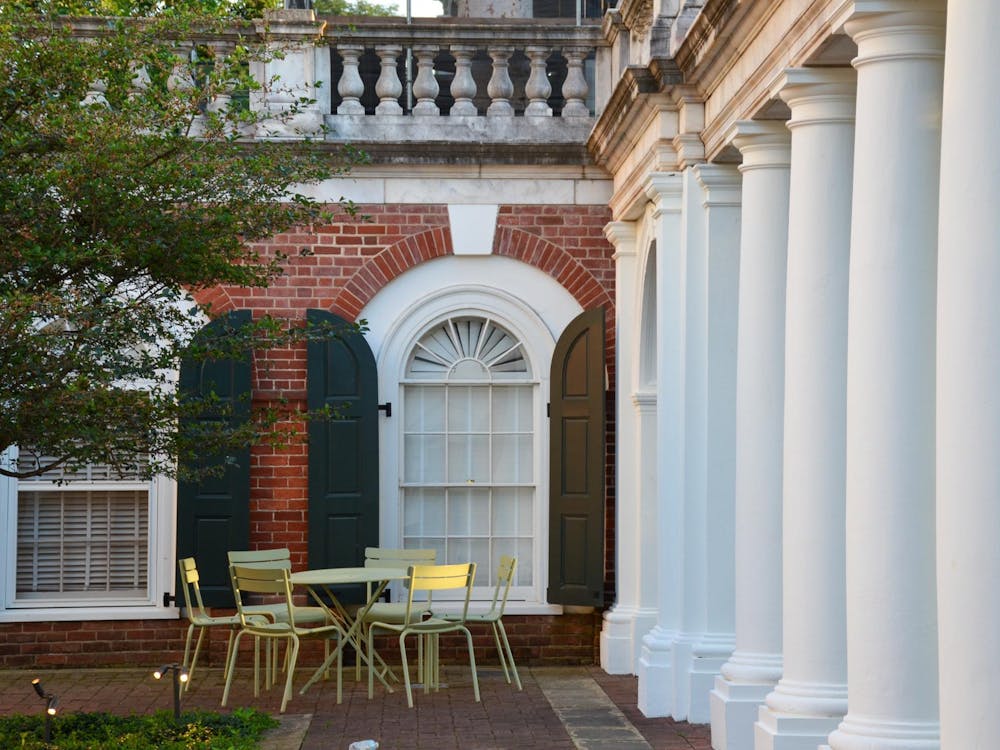Student Council passed its fall budget, a resolution supporting Divest U.Va. and a bill to create the University Networks of Care Ad-Hoc Committee during its general body meeting Tuesday night.
Community-based crisis response
The bill creating the UNOC Ad-Hoc Committee was sponsored by Abel Liu, president of Student Council and fourth-year College student, and Gaby Hernandez, chair of the representative body and third-year College student, on behalf of the University Networks of Care Coalition, Housing and Residence Life, undocUVA, Black Student Alliance and Political Latinxs United for Movement and Action in Society.
UNOC is a proposed community-based crisis response program that will remove the University Police Department from nonviolent mental health crises involving students. The pilot program is slated to launch in the fall 2022 semester, pending University approval, and will operate 24-hours a day Thursday through Sunday. Under the program, paid EMTs and skilled post-graduate student counselors would respond to all mental health crises, interventions with intoxicated persons and aggravated situations within UPD jurisdiction. Student Council is allocating $19,000 in student activities fee funding to the UNOC pilot program.
UNOC is modeled after the Crisis Assistance Helping Out On The Streets Program based in Eugene, Oregon. Rather than dispatching police officers, CAHOOTS instead sends two-member teams consisting of a medic and a crisis worker to aid those in crisis. The program was established in 1989 by White Bird Clinic and Eugene Police Department.
The bill to create the UNOC Ad-Hoc Committee was passed amid concern about increased crime this semester, as 10 community alerts have been issued since the start of the fall ranging from shots fired to prowling incidents. A newly-created UPD unit called the Community Oriented Policing Squad has faced criticism from Law students and organizations, who are demanding that the University rescind its decision to increase police presence and instead promote economic equality in Charlottesville.
By limiting police presence in mental health crises, UNOC hopes to improve relationships between students and UPD — especially students of historically marginalized identities. A fall 2020 survey conducted by Student Council revealed that student experiences with UPD officers dispatched in response to mental health crises have been “overwhelmingly negative,” with one student characterizing officers as “emotionally cold.”
Earlier this semester, a student organizer reported repeated unwelcome attempts made by members of UPD to contact them.
“The state of mental health crisis response and interventions into aggravated situations at the University is abysmal,” Liu said. “Students leave mental health crises in handcuffs, are taken into police custody and are often further traumatized, either by the University Police Department’s response to the mental health crisis or by their experience managing their mental health crises alone.”
The bill also cites current HRL protocol, which trains resident advisors to contact the Dean on Call, Counseling and Psychological Services or UPD in the event of a mental health crisis. Some students, however, have reported that RAs discouraged them from contacting UPD because of previous negative experiences.
Jayla Hart, co-chair of Housing and Residence Life and fourth-year College student, urged representatives to pass the bill during Tuesday night’s meeting.
“Having UPD come into residential buildings to help students has been very, very stressful, not only for residents but for RAs and SRs alike,” Hart said. “I implore all of you guys to consider what we're trying to do in terms of changing culture at U.Va., but also better supporting students — especially students of color — and other marginalized identities.”
Donavon Lea, vice-president of BSA and fourth-year Batten student, added that while he is excited to see UNOC finally come to fruition, Black students have been pushing for these kinds of changes for a long time.
“BSA has pushed for these sorts of demands for over 50 years, and it shouldn't have taken 50 years for something like this to happen,” Lea said.
Originally issued in 1970, BSA’s list of demands call on the University to increase the number of Black students, faculty and administration, divest from and demilitarize UPD and expand curriculum, among other issues.
PLUMAS, Central Americans for Empowerment at U.Va., the Afro-Latinx Student Organization at U.Va., the Cultural Organization for Latin Americans at U.Va., the Latinx Leadership Institute at U.Va, the Latinx Peer Mentoring Program and the Latin American Identities Coalition at U.Va. noted that the Latinx community on Grounds has struggled with access to proper mental health services for “quite some time” in a joint statement to The Cavalier Daily. Specifically, the groups cited the high cost of medical fees and the inadequacy of the University's Counseling and Psychological Services program, adding that because the Latinx community is so diverse and intersectional, students often find it difficult to find counselors within CAPS who make them feel represented and understood.
“UNOC would allow Latinx students and students of color at the University to receive support during a crisis,” the statement reads. “Having this issue of mental health crisis response addressed would allow PLUMAS, and the many Latinx organizations we represent, to advocate for improved mental health resources for Latinx students at the University.”
UNOC has been in development since fall 2020 by several partnering organizations — Student Council, HRL, BSA, PLUMAS and undocUVA — as well as University partners, such as UPD and the Equity Center. These five student groups will form the 2021-22 UNOC Coalition, which will guide the program's structure, funding and implementation this year.
Each partnering organization will appoint anywhere from one to four representatives to serve on the coalition annually. The president or chair of each organization will automatically serve as a representative and will select the other representatives.
Inaugural representatives on the coalition include Liu, Hernandez, Hart, Lea, Tyler Busch, Student Council representative and second-year College student; Deric Childress Jr., president of BSA and fourth-year College student; Ilyas Saltani, HRL vice-chair for community development and residential inclusion and fourth-year College student; Caro Campos, president of undocUVA and fourth-year College student; Paola Linares, vice-president of undocUVA and third-year College student; Booker Johnson, political action committee chair for BSA and third-year College student; and Holly Sims, senior resident for HRL and third-year College and Batten student.
Any partnering organizations and representatives are also permitted to leave the coalition for the following academic year, and new organizations may be added with unanimous consent from all current partnering organizations.
The proposed pilot program will be in place until at least the 2024-25 academic year to ensure the implementation of UNOC and its expansion. If successful, the UNOC Coalition will lobby for long-term funding strategies that divert UPD funding to UNOC to grow the program. The UNOC Coalition will provide updates on the program during Student Council general body meetings.
An appendix to the UNOC legislation also includes a memorandum of understanding that outlines the extent to which the partnering organizations are involved in the implementation and future long-term achievements of UNOC.
“While UNOC plays a role in both undocUVA’s larger sanctuary campus campaign and BSA’s historical police divestment and demilitarization demands, both undocUVA and BSA remain in full control of their own campaigns,” the memandorum reads. “Student Council, in particular, shall not infringe upon the broader work of undocUVA and BSA through the UNOC program.”
The memorandum of understanding will be reviewed by June 30 annually by representatives serving on the coalition.
Divest U.Va.
A resolution supporting the divestment of the University's environment from fossil fuels was sponsored by Rep. Rand Perry, fourth-year College student, on behalf of the Divest U.Va Coalition, Young Democratic Socialists of America at U.Va.’s ecosocialist group and Student Council’s sustainability agency. The legislation calls on the University to pull funding from its endowment supporting the usage of fossil fuels, something Divest U.Va. is pushing for the University to end by 2022.
The University's endowment reached an all-time high of $14.5 billion this year despite the ongoing pandemic. Investments in “real assets” — which include fossil fuel companies, as well as retail and hospitality investments — make up 10 percent of the University's endowment.
“This is a crucial moment,” Perry said. “If we can bring together students, faculty and community members, it's a moment where real change is possible, but the support of the University’s elected representatives — us — will help.”
The resolution was passed unanimously by representatives.
Budget
Student Council’s fall 2021 budget is $226,855 and will be distributed among its various branches — the Presidential Cabinet Agency, the Administrative Committee, the recently-created Support and Access Services, the Organizations Committee and the Representative Body.
Student Council meets weekly at 6:30 p.m. in the Newcomb South Meeting Room.
CORRECTION: A previous version this article misstated that Booker Johnson will serve on the UNOC Coalition as a representative for Student Council. The article has been updated to reflect that Johnson is on the coalition as a representative for BSA.







